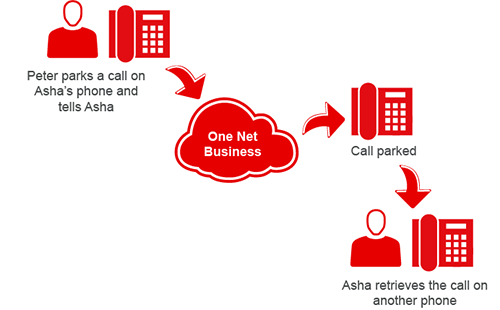 Deutschland - English
Deutschland - English- Country
-
 Deutschland
Deutschland 
-
 UK
UK
- Language
- Deutsch
- English

- Language
- English
- Language
- English
- Language
- English
 Deutschland - English
Deutschland - English Deutschland
Deutschland 
 UK
UK 
Requirements for One Net Business applications
If you want to transfer a call to someone who's not likely to be at their desk, you can park the call on their phone. When you've notified the user that they have a call, they can retrieve the call from their phone, or from any other phone by retrieving it with their extension.
The service is often used in conjunction with a paging or intercom system to let the person know where the call is parked. For example, if Peter in Accounts receives a call that he wants to transfer to Asha, the store manager, he can park the call on Asha's office phone and page her to let her know she has a call. Asha can then retrieve the call on her phone, or on another phone if she's not close to her office. Once Peter has parked the call, he can use his phone to make and receive calls as normal.

You can also park your own call if you need to do something or go to a different location before resuming your conversation with the caller. For example, a client calls account manager Jon with a request for technical information about a product. The product data sheets are in the IT office, so Jon parks the call on his phone. When he has the product information for the caller, he retrieves the call on a phone in the IT office by retrieving it with his extension.
Read about using feature access codes to park calls >
A park call group is a way to park calls with a group of users rather than an individual. When a call is transferred to a park call group, the system finds an available extension in the group against which to park the call and lets you know which extension it selected.
For example, a car sales manager might park a call on the sales team's park call group and then announce over the intercom, 'Would a member of the sales team please pick up on line 1234.'
Read about using feature access codes to park group calls >
Read about setting up park call groups >
If you have on-hold music set up, the caller hears music while they wait for the call to be picked up. If a call can't be parked or isn't answered within a certain time, it returns either to the original user's phone or to an alternative number. If, for example, the receptionist receives a high volume of calls, you can choose to return unanswered parked calls to a hunt group instead of back to the receptionist.
Extension taken
If you try to park a call at an extension that is already taken by another parked call, the system plays a denial tone.
A hunt group is a list of users who share calls to a single phone number. The system distributes calls amongst the group members so there is less chance a call will go unanswered.
Talk to the One Net Business administrator in your company. They understand your system best.
Only for One Net Business administrators: contact us if you have any questions.
Did you find this article useful?
Yes
No
Thanks for your feedback.